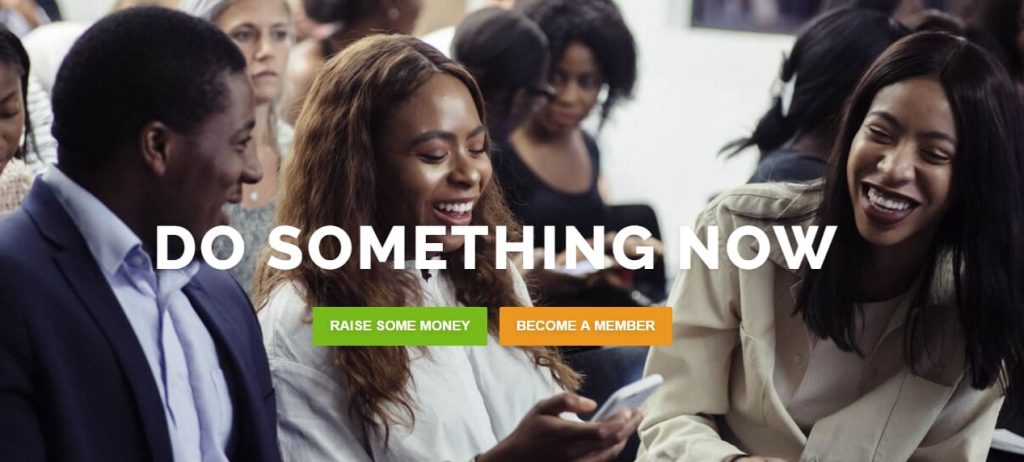Do male ideas rock and female ideas suck? 10 things women founders need to do to get funded!

[bctt tweet=”The statistics on Venture capital funding do not favour women founders” username=”SheLeadsAfrica”] You are a young woman, you are innovative, you have many ideas and you just launched a tech startup! Now, you need to get funded to take your startup where you want it to be. You have applied here and there and even made submissions and connections to venture capitalists but you are yet to make any headway and you know the survival of your startup depends on some fresh cash injection. It’s not getting any better because the statistics on Venture capital funding do not favour women founders. You see your business drifting into the number of un-funded women startups and you desperately need answers. Hi babe, are you there? If this is your experience as a female startup founder or entrepreneur, take a deep breath, you are so not alone. It’s no news that Venture Capital funding gender gap swings against women big time as male startup ideas get funded at a 16 to 1 ratio compared to those of women. According to Venture Capital database Pitchbook, Venture Capitalists invested $52.2 billion in male-run start-ups while female-run startups received only $1.46 billion in 2016. This figure paled in comparison to the other years in the last decade causing us to wonder if funding for women-run startups will ever get better. And why is this so? Do male ideas rock while female ideas suck? What do female founders need to do to get their start-ups funded in a male-dominated tech startup ecosystem which tilts towards men statups? Here are 10 things women founders can consider doing to get desperately needed cash to push their start-ups to the next level; 1. Learn as fast as male founders As a female founder, how fast do you learn? Are you comfortable with the things you know year in, year out or do you push your learning barriers to exhaustive levels? When it comes to male founders, we have seen them take drastic steps to get their startups going even if it takes pushing learning boundaries over and beyond their usual capacities. Then a Mckinsey management staffer, Eliam Medina undertook a one month crash course to learn how to code to get the first iteration for his free wills and legal service startup, Willing, up and running. And it is no surprise that more guys learn to code than girls. Data from Girls Who Code shows that computer science learning among women has reduced from 37% in 1984 to 18% presently. And when it comes to venture capital funding, one thing is clear, strong technical teams with a major bias for a technical founder is a good first step to knocking on VC doors for funding and getting their attention. Learning also traverses reading about other startup ideas like your life depends on it and using the successes and failures of other startup founders to your advantage. Who best is adopting this technique to create exciting startups than male startup founders, from 99designs to 99taxis, 99bitcoins, etc. Nikki Durkin, founder of defunct startup 99dresses has definitely seen men transform her failure into breathtaking successes which are also foundational to catching the eyes of investors. As female founders learning about one new idea a day can boost your strategy direction which gives investors the impetus to go with your call. 2. Have an idea arsenal and pick the best Consider why you started your startup in the first place. Was it out of your own need or a real need? While this may be tough to evaluate, candidly, it is best to have an idea arsenal. Your idea arsenal should be full of ideas which not only resonates with you but ones with real and researched needs with an addressable market size. Go beyond the scope of ideas for start-ups meeting only the needs of women. While this is not bad in itself, the venture world is run by men and they sometimes get lost when it comes to women specific ideas and don’t know why they should be investing. From this collection you have created, pick the best and launch it first. By the best, I mean the one with the most validation from prospects, possibly millions of people who will find this startup useful to them on probably a daily. This means that people can pay for what you have launched and the possibility of this is exciting to any venture capitalists. [bctt tweet=”The venture world is run by men & they sometimes get lost when it comes to women specific ideas” via=”no”] 3. Fail fast by launching other startup ideas Far from what most people who go into tech may think, creating a successful startup is not a Disney fantasy tale. The best startup founders did not necessarily hit it big on the first idea they launched. To put it in clearer terms, a lot of them ran with more than one idea. Stackoverflow founder, Joel Spolsky and his team had Trello and FogCreek up and running alongside. He opined that by chasing multiple ideas at once, anyone of them could succeed into the big leagues. Female startup founders need this perspective and be ready to fail fast like most of their male counterparts. This is because, no matter how lucrative an idea may seem, the time may not be right for its mainstream demand. This happened with all the devices created prior to Apple’s iPod and that should be the target of any female founder who wishes to be trolled with funding instead of actually chasing after it. 4. Spy for the extraordinary Venture funding, no matter how scarce they may be to female founders, can never shy away from the extraordinary startups run by women. Why is this? We have been ushered into a world of constructive and collaborative disruptions across industries all over the world, mostly spearheaded by technology. From Uber to Airbnb, Snapchat, Convene, and Spotify, we have seen tech ideas break the
Webinar with Aisha Addo: How to start a non-profit organization (Jun 20)

Aisha Addo is the founder of Power to Girls Foundation, an organization that helps girls identify their true purpose and calling. Join us for a webinar with her on June. 20th, as she shares with us some of her tips on social entrepreneurship. Entrepreneurship isn’t just one thing. You can be an entrepreneur in a small business, startup, large company etc. But if you’re interested in making the world a better place, you’re on your way to becoming a social entrepreneur. You need to ask yourself – What type entrepreneur do I want to become? Aisha Addo is a social entrepreneur, who has dedicated her life to empowering women and young girls with her initiative – Power To Girls Foundation. She offers them the mentorship, guidance and the resources they need to achieve their dreams and excel. Join us for a 45-minute webinar with Aisha Addo on Tuesday, June 20th, 2017. We’ll be discussing what it takes to become a social entrepreneur, and starting a non-profit organization. Register below to get the exclusive link to the webinar. [bctt tweet=”Join @AishaAfua for a webinar on Tue June 20th to learn how to start a non-profit organization” username=”SheLeadsAfrica”] Some of the topics we’ll cover: Starting a non-profit organization Risk taking in social entrepreneurship Having confidence in your idea How to live your most authentic life doing what you love. Webinar Details: Date: Tuesday, June 20th Time: 11am Toronto / 3pm Accra / 4pm Lagos Watch here: About Aisha Addo Aisha Addo is a graduate in Business Administration Accounting, but her true passion and dedication lies in ensuring girls around the world are provided with the guidance and resources that’ll help them to reach their full potential. Aisha founded Power To Girls Foundation, a non-profit organization to offer young girls the mentors and role models that were absent during her own youth. She is a recipient of the Young Black and Gifted Award for Community Service, was named a Black Diversity Group Role Model and One of 100 Black Women to Watch in Canada, and also among the 150 Black Women making history in Toronto. Her latest initiative is DriveHER, the ride-sharing service for women by women.
How to handle conflict like a pro

[bctt tweet=”There are many reasons you might have conflict in your business & you need to understand them” via=”no”] The former US president Ronal Reagan is quoted as saying, “peace is not the absence of conflict, and it is the ability to handle conflict by peaceful means.” This means that conflict is inevitable: we have it at home, at work, and in our social circles. The moment you have more than one person in a group, the likelihood of confrontation arises. Why? Because of differing views, because of differences in interests etc. If you are wondering if the conflict at your office is normal, wonder not, it is. What is not normal is the degrees to which it can go to as well as the irreparable damage it can cause if it is not dealt with accordingly. If you are a business owner or even an employee, the following tips can help you handle conflict better and foster a positive environment. 1. Understand why you have conflict There are many different reasons you might have conflict in your business. These range from personality clashes; communication gaps; disputes over approaches as well as competition for limited resources. Understanding the triggers from your environment is the most important thing you can do because only when you know what is causing something are you in a position to ‘fix it’. 2. Manage expectations Do you over promise and under deliver? Managing expectations internally is important because people know what they can expect from you and the work environment. Often times in trying to get the ‘best’ talent through the door, business owners make promises that they cannot meet by the time they say they will. This leads to resentment, which manifests in various problems that affect the business owner, colleagues and even customers, rather under promise and over deliver. 3. Draw up a conflict resolution guide In the same way that you would have a code of conduct that you get every employee to sign when they come on board, so too should you have a conflict resolution guide. The contents (and comprehensiveness) are dictated entirely by the anticipation of conflict in your company as well as the gravity of those conflicts. Start simple, put together questions that first and foremost facilitate a reflective purpose. [bctt tweet=”Drawing up a conflict resolution guide could help handle conflicts in the workplace effectively” username=”SheLeadsAfrica”] 4. Set rules! Over and above the standard policies and codes of conduct, have rules of engagement that you compile with your team. When they have had a say on for example how they will relate to each other in the office, they are more likely to keep their end compared to when it is a rule from the boss. You can even take it a step further and develop shared values. Make sure you include how ‘we promise to deal with conflict in the office’. 5. Never take sides Yes she may have started with you when you were still a struggling business owner, and she understands the company, but just like everyone else you’ve brought on board, she has a role to play. Everyone who works with you makes a contribution and they all need to be treated fairly and with respect. That includes not being side-lined over another employee. Treat everyone the same. 6. Listen more and talk less As the visionary and not executor, yours is to spend more time listening than talking. Listen to what is not said especially because it is herein that the truth is often times revealed. Listen not to answer but to understand. When your approach is this, people will feel comfortable coming to you, be it for good or bad. And as a permanent effective strategy to conflict management, this accessibility is what you must aim towards. When you take even one of these tips and put it into action, you will be amazed at how much more manageable conflict in your workplace becomes. Remember that peace is not the absence of conflict; it is rather the ability to handle conflict by peaceful means. Sometimes all it takes is being proactive and putting systems in place that support dealing with conflict when it arises.
Instagram Q & A with Peace Hyde: Fighting against the odds (May 30)

Day after day, African women keep breaking boundaries and creating an impact in their respective professions. Who says you can’t do the same? Sometimes we might encounter a hitch during our journey, but as Motherland Moguls, we have to keep fighting against all odds and let people know that we’ve got this! Award winning presenter and TV host Peace Hyde is contributing to the narrative of growing female power on the African continent. Through her work, she encourages young African women to be bold and break barriers to achieve their set goals. Join us on Instagram for a Q & A session with Peace Hyde on Tuesday 30th May. Peace will be sharing her entrepreneurial journey with us, and answering all your questions about fighting against the odds. [bctt tweet=”Join @Peac_hy for an Instagram Q & A on May 30 to discuss fighting against the odds” username=”SheLeadsAfrica”] We will be giving away a FREE cheat sheet with Peace Hyde’s top 10 lessons for everyone fighting against the odds. Register below to get your copy. Instagram Q & A Details: Date: Tuesday May 30th 2017 Time: 1pm Lagos// 2pm Joburg// 3pm Nairobi Where: https://www.instagram.com/sheleadsafrica/ About Peace Peace Hyde is the Forbes West Africa Correspondent. She is most widely known for her role as host of the flagship Forbes Africa TV show, “My Worst Day with Peace Hyde”. Some of the guests on the show to date included Africa’s richest man, Aliko Dangote and second richest woman in Africa, Folorunsho Alakija and many more. Peace is scheduled to launch a new show “Against the Odds” which will feature appearances from prolific African women who are recognised for their accomplishments in business or career.
Boost your business with Morin Oluwole: How to market your business on Instagram (May 23)

Now that Instagram has over 300 million daily active users, true Motherland Moguls are leveraging on this huge market to boost their businesses. Social media is the new marketplace for anything, and Instagram is taking the lead, become the most popular platform. So why are you not selling on Instagram? As part of our Boost Your Business digital marketing training series, we are bringing you a Facebook Live session on Tuesday May 23rd with Morin Oluwole. Morin will be showing us how luxury brands sell their products on Facebook and Instagram and how you can do the same for your products. Morin is now Head of luxury at Facebook, and was formerly Chief of Staff to the VP, Global Marketing Solutions at Facebook where she developed business strategies for global brand partners. Register below to get the exclusive link to join this session Some of the topics we’ll cover How you can leverage Facebook and Instagram to get clients Key digital marketing lessons learned while working with global luxury brands Best practices of selling fashion on Instagram and Facebook Social and digital strategies to market online Facebook Live Details: Date: Tuesday May 23rd 2017 Time: 3pm Lagos// 4pm Paris// 5pm Nairobi Where: facebook.com/sheleadsafrica/ Watch video here: https://www.facebook.com/sheleadsafrica/videos/1887518318138146/ About Morin Morin Oluwole is an expert in positioning brands on social media. With more than 10 years of experience at Facebook, she knows what works and how to best maximize it. Morin holds a BA and MA from Stanford University in Human Biology and Sociology and an MA in Management from Columbia University. She was a Bill Gates Millennium Scholar and received the Dean’s award for academic excellence – both for 5 consecutive years. Morin who has lived on three continents and currently resides in Paris, has been featured in the New York Times, Black Enterprise, Movelifestyle.com, and Alder Social Media Report. She speaks four languages (English, Yoruba, Spanish, and French).
Facebook Live with Adepeju Jaiyeoba: Finding a purpose and choosing a career path (May. 19)

Have you been asked many times what you want to be, or do with your life, and every time, your answer has been different, or you stutter? When it comes to deciding on what career to face, some people get it right the first time, while others find themselves twirling and spinning, until they find a rhythm. Join us for a Facebook Live session on Friday 19th May, with Adepeju Jaiyeoba – White House Emerging Global Entrepreneur and Founder of Mother’s Delivery Kit and Brown Button Foundation. She’ll be talking extensively about finding your purpose and choosing a career path. Adepeju will be answering individual questions during the Facebook Live, so register below and ask your questions. [bctt tweet=”Join @pjlalah to discuss finding your purpose and choosing a career path on Facebook Live (19 May)” username=”SheLeadsAfrica”] Some of the topics we’ll cover Life after university: Your next steps 7 ways to finding your purpose Making the right professional and career decisions Facebook Live Details: Date: Friday 19th May 2017 Time: 1pm Lagos// 2pm Joburg// 3pm Nairobi Where: facebook.com/sheleadsafrica/ Watch video here: https://www.facebook.com/sheleadsafrica/videos/1885847208305257/ About Adepeju Adepeju Jaiyeoba is the Founder of ‘ Mother’s Delivery Kit ’ social venture which provides ultra affordable sterile supplies for women to use at childbirth while also increasing access to quality healthcare services, as well as Brown Button Foundation, an NGO which trains traditional birth attendants that takes more than 55% of child delivery in Nigeria. Although she’s a graduate of Law, she has a strong background experience in global health with the United Nations Foundation and background knowledge in Business from the University of Texas, Austin USA. Adepeju is a White House Emerging Global Entrepreneur honoured by President Barack Obama, and has been mentioned in the 2017 100 Most inspiring Women in Nigeria, She Leads Africa’s top 10 female entrepreneur for Diaspora Demo day, 2017 ONE African Champion, 2015 YNaija top 10 most influential Nigerians under 40 (Advocacy), and an acknowledged Global Change Leader by the Coady International Institute, Canada.
Chellie Clarkson-Brown: Designing for women of color and overcoming the #icebergsyndrome

[bctt tweet=”Chellie Clarkson-Brown wants to make African-inspired apparel an everyday staple in Western Europe” via=”no”] No one ever tells you about the amount of work that goes on underneath the surface of the water- #icebergsyndrome… but keep keeping on and eventually the tip of your iceberg will emerge. Enter entrepreneur Chellie Clarkson-Brown the Founder and Creative Director of Afro Couture Designs LDN, a fashion brand focusing on sizes and designs for women of colour. With SLA contributor Neo Cheda, Chellie shares her entrepreneurship journey and what has pushed to her to success. Tell us about you and how Afro Couture Designs come about? I studied Pattern Cutting and Tailoring at London College of Fashion but left this to work within the retail industry. Well, it wasn’t for me so I returned to university at University College of the Arts. My time there was traumatic, to say the least. I was often denied the opportunity to express myself based on what I felt represented me. Everything I designed in reflection of my African heritage and life experiences, was, in my opinion, belittled and rubbished. I lost so much confidence in my abilities and myself, that I became depressed. To add insult to injury, I wasn’t even able to get any real retail therapy without having to break the bank. Come on now, we all know that the only way to make a girl feel good about herself in circumstances like these, is a good old shopping trip. The only items I could get on the high street were ill fitting for my body shape. As almost any woman of colour will know, it may fit everywhere else, but it “sho’ ain’t gone fit” around your hips, rear and thighs. Or you would go up or down a size to alleviate the problem above and guess what, it would fit everywhere else, but not your waist #BlackGirlIssues. So I did some extensive market research in order to collate a sizing criteria for women, particularly focusing on women of colour, as our primary target market. This has allowed us at Afro Couture Designs to create a more inclusive sizing range which is a better reflection of the modern day woman. Most importantly, it incorporates the proportions of women of colour too. As part of our initiative, we are committed to being environmentally friendly by being as sustainable as we are practical. Tell us about your vision for Western European Demographics. At Afro Couture Designs LDN, we design and create on trend contemporary African-inspired apparel and products and our intention is to make these products an everyday design staple within the Western European demographic. Our products are not intended to exclude or to be divisive, rather our products are primarily intended to celebrate and embrace all things African and showcase the beauty within the continent and how it can compliment European fashion trends. We use high end design techniques, pattern cutting, and production techniques and source the highest quality fabrics. At Afro Couture Designs LDN, we fuse and mix together an eclectic range of fabrics from the both the Western European and African Hemispheres to bring you our AfroEurocentric collections. The collections within these ranges are African inspired with a contemporary twist and are intended for those who not only think outside of the box but actually go one step further and throw it away altogether. Afro Couture Designs LDN, provides a multi-faceted design and production service from fashion, products, and interior design to delivering fashion workshops and property development. Afro Couture Designs LDN’s business objective, is to be the one-stop shop or boutique for all your design requirements. Akin to the likes of the Selfridges of London or Macy’s of New York- for all things Afrocentric. What accomplishments are you most proud of? Getting it all together again from being homeless after my home was repossessed and I lost my job. The struggle was harder as I was a single mother at the time. But all things are possible through God. “Everything is possible for one who believes” Mark 9:23. #Ifyoucanconceiveit- #youcanachiveit What challenges have you faced that are unique to your business? Trying to blend Afrocentric influences harmoniously with the Eurocentric to create the AfroEurocentric brand. Additionally, trying to secure financial support for such a new concept with the intention of making the brand available to the mass market. [bctt tweet=”Afro Couture Designs aims to give exposure to established & emerging African artisans” username=”SheLeadsAfrica”] Which 3 African women that inspire you and why? My Grandmother, the late great Madam Margaret Ntiamoah For her determination, her tenacity and most importantly how resourceful she was. I remember growing up in Ghana during the coup d’état of 1979. Food was rationed and money was tight. There were so many of us living in one room and my Nana, would create gourmet dishes for all of us from one tin of baked beans, or even crack 2 eggs in a spinach stew and manage to make that stretch around 6-8 of us, with some left over for the next day. On the days we had money for coal, in the morning before school, Nana would set the coals in the coal pot (which I’d fan) to make the morning porridge, the smouldering coals would then be put into a cast iron, hence the name, to iron our uniforms. After that, the hot cast iron would then be dipped into the cold bucket of water to warm it up for our morning baths. Talk about resourceful! She got up at the crack of dawn every morning well into her later years to go set up her market stall at Mokola market without fail. Her work ethic has stuck with me till this day. God rest her beautiful soul. Ghanaian designer, Christie Brown For being self-taught and still managing to make it into the mainstream fashion world. I’m inspired by her style and the fact that she has slowly over the years managed to place herself
Case study: How your business can stand out from the competition

[bctt tweet=”Competition is a “necessary evil” of doing business, here’s how to make yours stand out” username=”SheLeadsAfrica”] If you’re in business, competition is something you can’t do without. In other words, competition is a “necessary evil” of doing business. It does not, however, mean that competition in your business area is a bad thing. On the contrary, when there are several competitors in your niche, it shows that you’re on the right track and that there’s money to be made there. What you must do, as a business owner, innovator and Motherland Mogul, is figure out how you can stand out from your competition. You need to ask yourself: “If I must have competitors, how do I make sure I’m able to stand out? How can I be visible to my potential customers and clients? How can I meet my revenue expectations?” In this article, I’m going to share with you a quick way to combat that. I’ll be sharing two case studies of how companies were able to stand out from the competition by thinking out of the box. [bctt tweet=”Ask yourself the following questions if you want to stand out from the competition” username=”SheLeadsAfrica”] Guideline: How to stand out from the competition First things first, look at the top 10 companies/competition in your industry. Make sure you take note of the following: What are they offering? How do they offer it? What are their price points? How is their customer service? What is their packaging like? Then, ask yourself: What are their strengths? What are they doing that you should emulate? Do they have any weak spots? Is there something they are doing that you can do better? Finally, determine how you can leverage all this information to be different. Ask yourself: How can you do things differently without undermining the value of the products and services you sell? #MotherlandMogul tip: Sometimes, all it takes is improving the experience your customers and clients get doing business with you. Got it? Alright, now to the Case studies. Case Study #1: Rebecca Minkoff Stores I stumbled across an article about Rebecca Minkoff in Inc. Magazine. If you prefer the tl:dr version, here’s the story in a nutshell. Rebecca Minkoff launched her brand of ready-to-wear accessories, handbags, and footwear in 2005. From the start, she knew it won’t survive as a regular store. So, she set out to create the perfect shopper experience. When shoppers enter flagship stores, they are greeted by a digital touchscreen wall that displays the latest runway selections, offers style suggestions from Rebecca Minkoff herself and can even take drink orders. Then, each item contains an RFID tag that detects when a shopper enters a dressing room. When the tag is scanned, an image pops up on a mirror with suggestions for complementary accessories. Talk about innovative. Rebecca Minkoff really did create a unique shopping experience. [bctt tweet=”How to be innovative and come up with new ways to stand out from the competition” username=”SheLeadsAfrica”] Case Study #2: The Trunk Club The Trunk Club is a subscription service for male fashion. Here’s how it works. When you subscribe, a consultant gives you a call and talks with you to find out your “style”. Then, each month, you get a trunk box (miniature size, of course) containing selections for the month. Each item is packed attractively and have price tags on. As the consumer, you have the choice to take what you want and return the rest. Whatever you don’t return, they bill to you. If you can’t imagine how this would work, check out this guy here as he receives his first trunk box. Bottom line is this. The Trunk Club is another innovative way of standing out from the numerous online shopping sites out there. That’s it. Go through the guideline above again and begin to come up with new ways to stand out from the competition. One last thing. The two examples I gave happen to be in the fashion industry, but there are many companies out there in various industries being innovative and coming up with new ways to stand out from the competition. Now, it’s your turn to think outside the box. Go on, I know you can do it! #MotherlandMogul tip: What cool innovative ways have you seen companies use to stand out from the competition? How can you replicate them?
‘Go the extra mile, because it’s usually empty’: Why you should Do it Now Now

[bctt tweet=”How @DoitBayo is bridging the gap between who people are now and who they want to be” username=”SheLeadsAfrica”] Do it Now Now is a crowdfunding platform that has the social development of Africa at its core. Founded by Bayo Adelaja, a research assistant at the London School of Economics, Do it Now Now helps supports social entrepreneurs in their quest to make a positive impact across Africa. Bayo also hosts frequent StartUps for Africa events on Google Campus, in the heart of London’s Silicon Roundabout. We caught up with Bayo to find out a bit more about the Do it Now Now journey and the importance of social entrepreneurship right now. Where did the passion for entrepreneurship come from? I love working at the LSE, the work is great and so are my colleagues but I’ve always had that entrepreneurial spirit within me. The only way I could do that was by stepping out of my comfort zone and saying this is who I am, who I want to be and I’m not going to let anyone talk me out of it. I had been talked out of it in the past when a company that was trying to buy another start-up I had tried to steal my idea. At that point I wasn’t good at saying I needed help or a support network to guide me on the journey. I realised that most people don’t have that support. They also lack the skills, knowledge and connections. I thought to myself, wouldn’t it be great if I could help people to bridge the gap between who they are and who they want to be? What is Do It Now Now? Do it Now Now is a crowdfunding platform with an incubator attached to it. We help people raise up to £10,000 ($12,000) from their friends, family and other interested parties. Do it Now Now helps businesses organise their campaigns, their perks and rewards, the marketing, the budget, everything. We work with the startup from A to Z, giving them all the support they need over the course of a year to help them build a healthy, scalable and sustainable business. [bctt tweet=”We help people raise up to £10,000 from their friends, family and other interested parties” username=”SheLeadsAfrica”] My job at the LSE has helped a lot as. I saw that there was a gap between the amount of work that aid organisations can do and the amount of development needed on the continent. Social entrepreneurs and start-ups can be more flexible, quicker on the ground with more local knowledge of the community that they’re in. That’s a huge advantage, and an opportunity for them to link up with other organisations in Africa who might be able to support them in one way or another. We also partner with incubators on the continent such as the Kumasi Hive, working with tech entrepreneurs in Ghana. How does the fundraising process work? You raise money with us and we help you grow. Then, we expect you to donate 20% of your gross income or £500 ($600), whichever amount it higher, to the charity that you chose at the beginning of your campaign. Do it Now Now collects commission that enables us to run the programme. We also have Startups for Africa, the free version of the programme which brings together people who are interested in growing their businesses, fostering collaborations and getting a conversation started. We want to show people that it is possible to be a purposeful, conscious person and have a business that is not just about the money, but about people and causes; it’s a heart thing. Money is great but being part of a community that cares about people and supports you is so much better. How can social entrepreneurs be successful on the continent? Do it Now Now is based on this principle: start now, plan now, do it now and do it well. Get on your feet and keep moving. So many of us have a good ideas that will change Africa but we spent too much time planning and researching. We’ve been relying on potential for years, if not decades. I want people to see that it’s not difficult at all to be a purposeful business. Social entrepreneurship is a fantastic way to support Africa’s development and still support yourself financially. I’m not here to simply line my pockets and die rich, I’m here to help people and improve life on the continent. [bctt tweet=”I want people to see that it’s not difficult at all to be a purposeful business” username=”SheLeadsAfrica”] If we have businesses that are strong, healthy and doing positive things it becomes good PR for Africa. Be passionate about your business, your people and the rest of the world will see it too. We need to recognise who we are, where we come from and build what’s needed —no one is going to do that for us. Africa is not a token, it’s not something you do on the side, you need to treat it with the respect that it deserves. How do you balance a full time job and running Do it Now Now? Well, I work about 80 hours a week: I wake up at 5am to build my business then go to work at 10am. Then I sleep and do it all over again, because I’m super passionate. Someone once told me ‘go the extra mile, because it’s usually empty’. If we just pivot the purpose of business we can make a truly sustainable and long-lasting impact. [bctt tweet=”‘Go the extra mile, because it’s usually empty’ – how to make your mark” username=”SheLeadsAfrica”] How can a budding social entrepreneur get started? Pick a problem and pick it wisely. It has to be something you’re passionate about, otherwise you’ll quit. You’ll quit quickly and you’ll leave people in the lurch. Pick something small and specific, then you can then blow it up and make it big. Always work with other people and look out for collaboration opportunities.
Why research in business should be a daily routine

One of the very first lessons I learnt about entrepreneurship, is that if I don’t do it, someone else will and that once you do it, everyone else will. Let me break it down. The first lesson is probably much easier —someone will, eventually, spot the gap in the market and attempt to fill it. The latter is the lesson a lot of start-up entrepreneurs don’t want to think about. That once you decide to fill that gap, soon everyone else (and trust me, some of them have been sitting on the idea waiting for someone to do it first) will. This is because you are their case study and now they know the idea does in fact work. A typical first response is usually, “that’s my idea!”, when in fact, we should be thinking about the opportunity that it presents. The good news is, if you’re already thinking ‘competition’ and ‘unique selling point’ then you are halfway there. The answer is research, constant research. From my early high school days, I was obsessed with research, particularly on the Internet. It started with me always wanting to have the answers, because I hate not knowing. Gradually, it became a very educational and growth-fuelling hobby. Research, although mostly associated with reading, isn’t limited to that. Depending on the industry and sector you want to operate in, it could include you physically getting out of bed and attending seminars or, chilling by the Mall of Africa, watching how people walk, talk, laugh or studying what they are wearing, which shops they visit first and how they arrived there or, stalking interesting people on Twitter. The business environment is ever-changing and to get with the times, you need to research. Whether you are an aspiring entrepreneur or an established one already, there is always room for growth and improvement. Research in theory You may not know it, but there are many forms in which research takes shape outside of Google and Yahoo, and these are three of the absolute favourites right now: Social media Yes, it’s not just about the number of likes on your latest pic. Facebook, Twitter and even Instagram can be a huge source of information. It allows you to tap into your (potential) ultimate client/customer’s mind. You will know what they are thinking and what they want —all of this is embedded in everything they complain about, decode it. It can also be a very good way to see how your closest competitors have positioned their products and services and learn from that. Trends grow on social media, if I see someone with a 10k followers wearing yellow jeans, I want to buy them. Keep an eye on people with huge followership and influence on societal behaviour, these are people commonly known as ‘twelebs’ and ‘felebs’. Blogs The beautiful thing about blogs is, the research is actually done for you (but be sure to verify, remember, if it’s my blog, I can put up anything I want). Bloggers usually bring the newest trends onto their blogs for their readers, if you comb through their content, you will find that they are communicating to you the gaps that are opening up in the market. Video driven sites like YouTube Although most people would instantly associate YouTube with music videos, there is a lot more to it. Tutorial videos and even more serious documentaries are put up there, it is a great source of information for when you’re looking to do something like write a book or even start a blog on a related subject. Research in practice Lerato wants to start an online channel but she doesn’t understand how it could be financially sustainable for her. Also, she has no idea what kind of content she wants to put up on her website/channel. What can Lerato do to help solve her dilemma? Correct, research! 1. Use the resources you have Lerato has a Facebook account, but now that she knows she has to research, she doesn’t know how Facebook can be used to do that. Easy, the answer is trends. First, she needs to zero in on a subject. Does she want it to be a health site, lifestyle, entertainment or news site for example? For that she can visit sites that already exist to see which she feels is more for her. Let’s say she chooses a self-help/DIY type of site. 2. Ask and answer the right questions That’s where social media comes in, what do people need help with? Lerato will now study the questions people post on Facebook or tweet on Twitter. She will also check how many of them get the answer they are looking for and how long it takes them to. Not only is this research in terms of content, but it also allows her to see if there really is a market for the site and if it will be more effective and efficient for the user to go to her site instead of asking for help from his/her friends on Facebook. Once she is done with her decision, she goes to Google and types in “start an online DIY site”. Voila, a link to an article about how to make money from such sites comes up. Of course she clicks on the link, now she knows where her revenues will come from. 3. Don’t stop researching A few months later, Lerato’s site, From Your Toolbox, is ready for action. It is an instant hit with her friends and followers, with amazing readership ratings. Soon she starts receiving requests for advertising space, nothing can stop Lerato now. One day, on her timeline however, she learns that her friend has started an entertainment news site and instantly she is shaken. What do you think Lerato does to deal with this development? Lerato doesn’t like fighting, so no. Instead, she uses the resources that are available at her disposal. And that is how she gets into the culture of research, following new trends and
